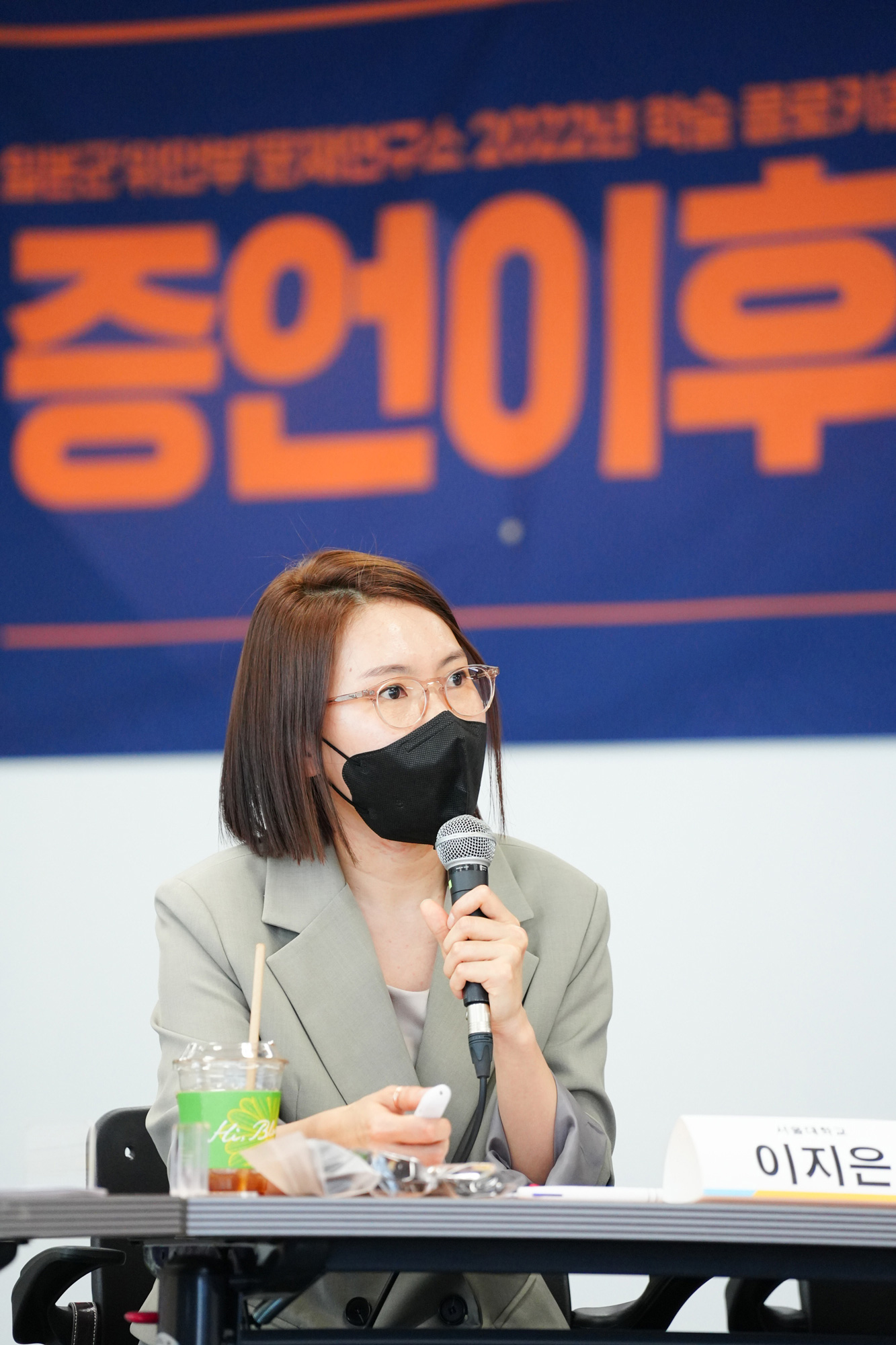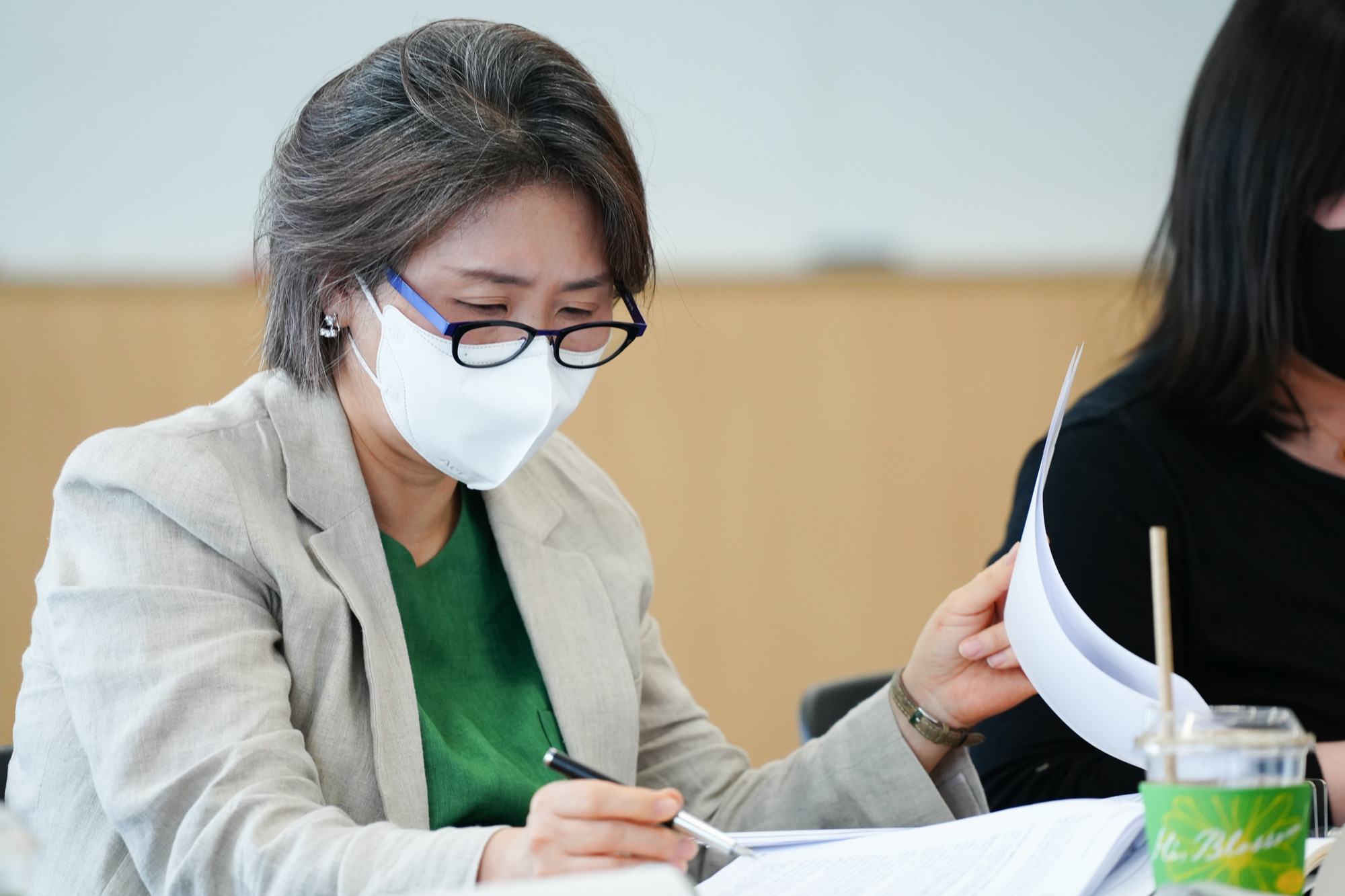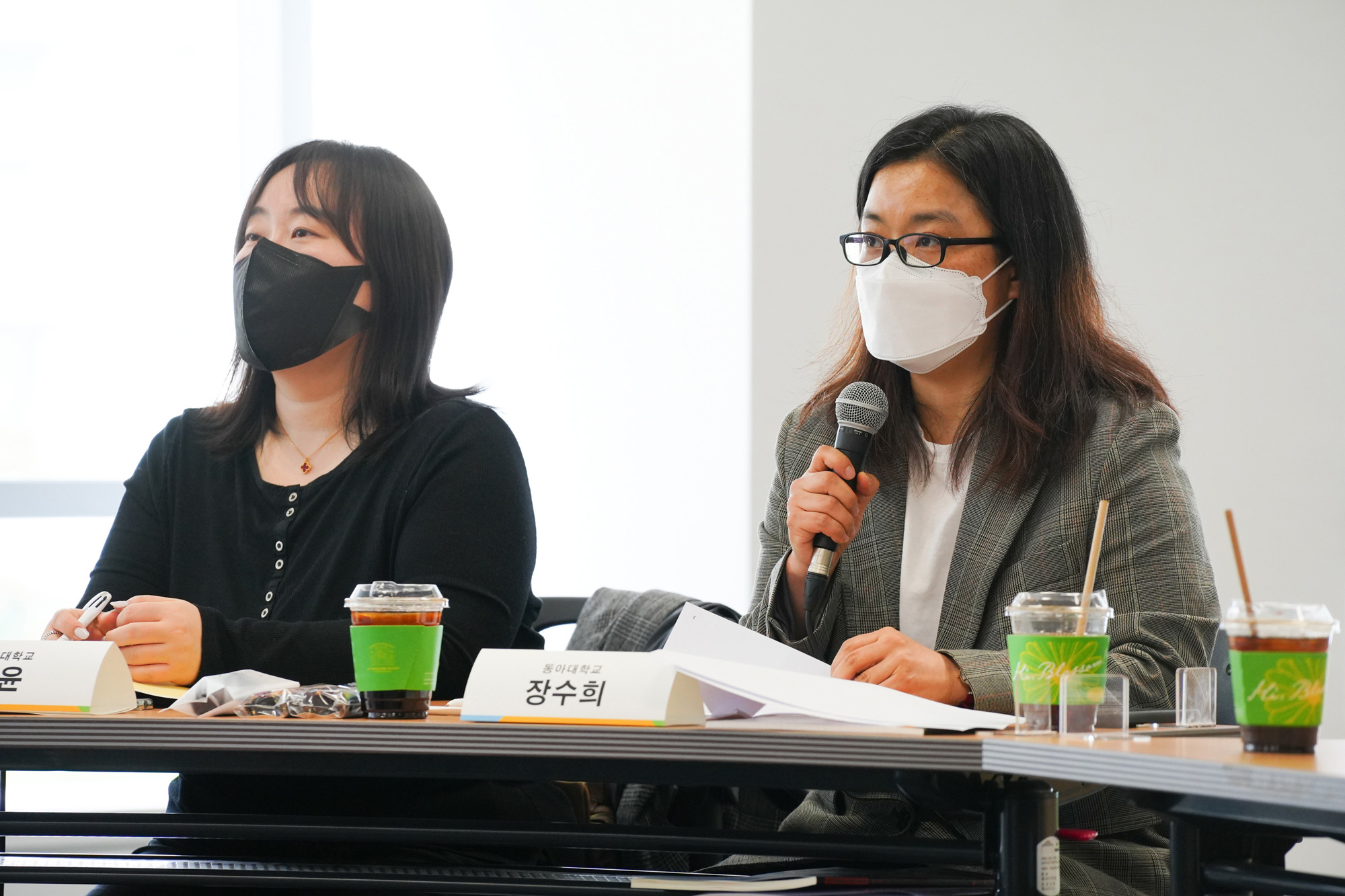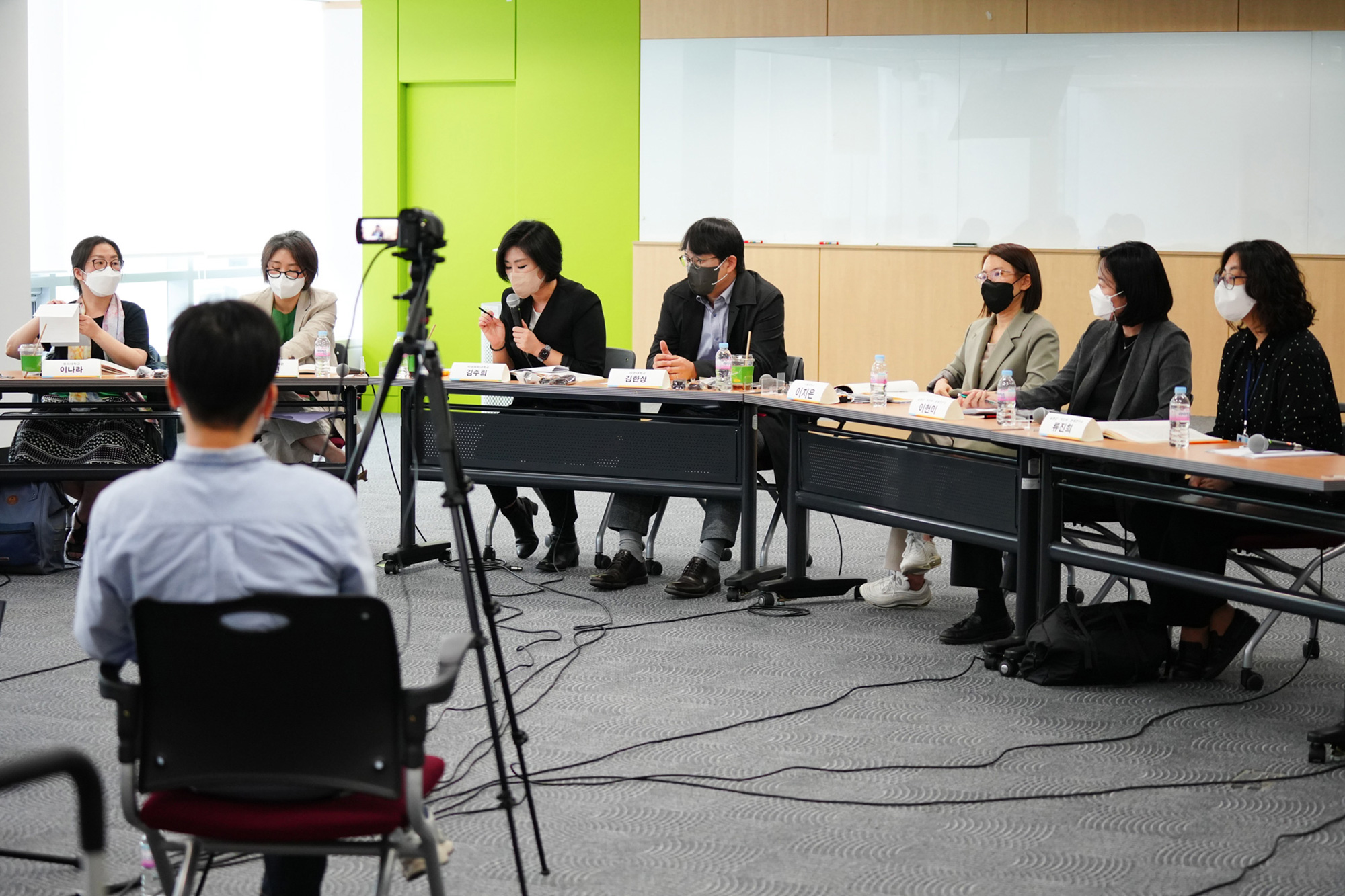A ‘House of Justice’ without justice, a history war without truth
On April 28, the Research Institute on Japanese Military Sexual Slavery held a colloquium titled “After Testimony: The Ethics and Violence of Representing the Trauma of the Japanese Military ‘Comfort Women’”. At the end of this colloquium, one of the speakers, senior curator Soojin Kim, summed up the warlike situation faced by the social/human rights and academic campaign for the Japanese military “comfort women.” She referred to “Korean history and the Japanese military ‘comfort women’ as a proxy battleground.” This expression does not go at all too far, nor does it fall the slightest bit short. As we all know, whenever the Japanese military “comfort woman” issue has the focus of collisions between Korean and Japanese nationalism and the roiling waters of domestic and foreign politics and international diplomatic motives, the efforts and achievements we have made on behalf of the movement have inevitably been chipped away. The impact has been evident in a number of recent incidents: the South Korea-Japan Agreement of December 2015 on the “comfort women” issue, allegations surrounding the Korean Council for Justice and Remembrance for the Issues of Military Sexual Slavery by Japan, and the claims made by J. Mark Ramseyer, which have also been a key issue at this colloquium. The surviving “comfort women” have come forward to testify and fight as part of an extraordinary movement over the last 30 years, yet all of this was brushed aside with a “final and irreversible agreement” that involved no inquiry into the truth, apology, or attempts at reconciliation; their very subjectivity and sincerity have been openly disputed, as if their voices were merely speaking on behalf of others.
These circumstances reminded me of the “Beth Hamishpath,” the “House of Justice” without justice that Hannah Arendt so incisively described 60 years ago. At the beginning of her book Eichmann in Jerusalem, Arendt discerned how Adolf Eichmann’s trial in Israel as a key figure in the “Final Solution” to the Jewish question had unfolded like a dramatic “show” in the name of restoring justice. In the scenes behind the trial, the true essence of “justice” was fading away: the Zionist desire to establish the identity of newly-founded Israel as a nation based on a nationalistic (ethnocentric) dichotomy between Jews and Gentiles had become entangled West Germany’s concerns over the anti-German sentiment that the trial might encourage internationally. Arendt's keen insight sparked anger and criticism from Jews, but it led to her formulation of the concept of the “banality of evil” as a critical and reflective approach to developments in 20th century human history: matters such as totalitarianism and racism, human violence, unreasonable madness, and—as the aggregation of all these things—Auschwitz.
Arendt’s lessons offer a valuable reference for the “history war without truth” that we see today with the “comfort women” issue—an intensely political war over historical matters that purports to be about truth but is actually unconcerned with it. Rather than being drawn into their battle, it is time for us to posit and reflect on certain questions about the “comfort women” issue that demand rediscovery amid their unavailing efforts—questions such as “How do we not know what we know?” which was previously discussed as the topic of this colloquium’s roundtable—and to show the kind of valuable wisdom that might bring about a new paradigm for the movement. I believe we will be able to rediscover our issues in their fight as these different efforts come together: attempts to rediscover the dynamics of the supranational solidarity among diverse actors through reflection on the history of the movement for the “comfort women,” as we saw in the presentation “Listening to ‘between’ testimonies: a critical contemplation of methods of acquiring/adding the social meaning of testimony” in Part I of this colloquium; attempts like presenter Emily Jungmin Yoon’s “found poem” regarding the testimony from the “comfort women” in Part II; and the defiant attempts by the National Museum of Korean Contemporary History to simultaneously move beyond both the non-placeness and intense political confrontation that art exhibitions related to the “comfort women” in Korea have run up against.
The ‘essentialism’ issue underlying the testimony and representation of “comfort women”
As the colloquium’s theme of “Ethics and Violence in Representing the Suffering of the ‘Comfort Women’” suggests, representation of the “comfort women” victims, who are often described as having endured an indescribable experience, poses a number of questions. Is it possible to accurately represent an experience in language when that experience exceeds the limits of or becomes lost in language? Is it morally right to represent the experience in simple terms through language, and is it not a form of violence to do so? At the root of these questions is the underlying belief that objects have an inherent essence that cannot be “re-presented” through “representation.” This sort of essentialism factors to some extent when the testimony of the surviving “comfort women” is granted the authority of legal evidence.

As mentioned in Jieun Lee’s presentation, the tendency to perceive the lives and experiences of the “comfort women” victims as “living evidence” and “evidentiary testimony” bears connections with the purpose of the “comfort women” campaign, namely to investigate and uncover the “truth.” All aspects of the “comfort women” issue are governed by the notion that its “truth” or “essence” can and should only be presented by the party who is the subject of that experience—in other words, that it should not undergo the secondary process of representation. Lee also points out the dilemma wherein the “comfort women” have had no choice but to come forward and endure secondary victimization by the public eye in order to galvanize the movement. This dilemma is likewise a contradiction born out of the essentialism inherent in the testimony and representation of “comfort women.” On the other hand, essentialism also gives rise to a contradictory situation in which the existence and testimony of a surviving “comfort woman” are repudiated when her life does not conform to the typical image (representation) of a victim (representation of a victim) in terms of the essential characteristics of “comfort women.” In this context, Lee's discussion critically considers how perceiving a victim's life and experiences as “living evidence” may inflict a form of violence by imposing the truth of life as a “comfort woman” over the victim’s entire lifetime.
Meanwhile, “Toward an attentive gaze: representing the issue of ‘comfort women’ at the National Museum of Korean Contemporary History” reflects concerns over the issue of non-placeness encountered by the historical exhibition as a means of representing “comfort women.” With no “comfort stations” present as historical sites in contemporary Korea, exhibitions related to the “comfort women” here are incapable of offering visitors the experience of “standing in the same place or at the scene where the actual incident took place.” The history museum's solution to this issue has been to overcome the issue of absence through the use of the voices and corporeal bodies of the surviving victims, since they have presented themselves as “living evidence.” Senior curator Soojin Kim explained how she has designed exhibitions by focusing on portraits of survivors engraved on lead plates and on testimonies in their own voices, thus deploying a representation strategy designed to help visitors immerse themselves in the victims’ existence and stories.

However, emphasizing physicality in representation may result in an effect where strong fellings forthe surviving victims comes ahead of historical awareness of the “comfort women” issue itself. Panelist Nara Lee points out that experiencing the “physicality and presence” of the surviving victims is “not equivalent to covering over the tracks of silence and absence” in their history of tragic experiences. While the surviving victims may have come forward as “living evidence,” the reality of historical facts related to the “comfort women” being frequently threatened with the counteroffensive of historical revisionism (as seen in the Ramseyer situation) underscores the need to escape from the essentialist illusion concerning representation of the present. In this world, matters regarding the truth of something are not merely reducible to its “essence,” nor is truth acquired from this. This is even more the case for an issue like that of the “comfort women,” in which issues of the history of colonialism, imperialism, nationalism, and androcentrism are structurally entangled with political and social systems, power structures, and the legal system.
Nevertheless, the illusion of presence is powerful, and there has been an ongoing tendency to attempt to prove the truth of issues related to the “comfort women” through the authoritative data provided by image materials. The keynote presentation in Part III, titled “The gendered nature of the use of visual data in public memory,” points out that with media platforms publicly distributing National Archives and Records Administration (NARA) video materials showing presumed Korean “comfort women,” there has been a growing perception of such video materials as having the authority to judge the historical facts or truth of the issues related to the “comfort women.” It is evident that this perception is informed not only by the belief in the scientific objectivity ensured by the technology of the video medium, but also by trust in the authority of data kept by the US government—the “global policeman”—and the presumption that these materials must be objective. However, given that the issue of the “comfort women” relates to sexual crimes, there is also the risk, as presenter Hansang Kim pointed out, that the sexual violence endured by the victims could be consumed as “spectacle” through the video medium. Here, once again, moral issues rooted in the essentialism of the testimony and representation of the “comfort women” become a source of controversy.
No clear conclusion was reached in the general discussion that took place after the keynote presentation in Part III. As this shows, it is indeed difficult to devise a solution to resolve this issue. If we trace it back, we find that it is also a vast issue that requires us to review even the most fundamental systems of ontology and epistemology. In that sense, it is not the conclusion of this colloquium—nor should it be the argument of this text—that it is imperative for us to overthrow and dismantle the essentialism underlying the issue of the “comfort women.” However, it has led us to recognize this issue as being among the various topics, and it has reaffirmed the importance of reconfiguring the issue so that it does not succumb to essentialist reductionism. The academic research and movement are not intended to neatly bring an end to things through “agreement” or “reconciliation,” but to intervene in the issue as necessary to ensure that improper “resolutions” do not lead to “final and irreversible” catastrophe. To avoid a situation where we are left with no choice but to cut with a single stroke like the Gordian Knot, we must isolate the different strands of the issue and identify the essential ones within the tangled skein of questions.
Extending the testimony and expanding the movement
“Why don’t you guys just get along? The guys: Japan and Korea. Meaning: move on”
This question asked by a Canadian was included in “An Ordinary Misfortune”, the first poem of Emily Jungmin Yoon’s collection, A Cruelty Special to Our Species. This seemingly naïve yet actually violent question perceives the “comfort women” as a field of repeated, meaningless battles concerning the past, with neither Korea nor Japan able to gain any ground. There have been ongoing efforts to move away from this sort of simplified frame, and there will be more going forward. The “comfort women” issue is an important area where history, sociology, literature, politics, human rights, peace, and the feminist movement intersect in the post-colonial, post-modern, and transnational era, and in that sense these efforts are all the more essential. It is necessary for us to continue extending the testimony and expanding the movement by moving away from “their” fight, which causes the “comfort women” issue to be perceived in superficial terms, and turning itself instead into a form of practice to rediscover “our” issues. The key forms of political, social, and cultural practice that enable such an extension and expansion can ultimately be found in representation, the problematic nature of which was reaffirmed through the discussions at this colloquium. The work of Soohee Jang, who archived the narratives of the “comfort women” within the vast silence of literary history, and the work of Emily Jungmin Yoon, who reconstructed the testimonies of the “Comfort Women” across generations and nationalities into the poetic utterances of “found poetry,” are attempts to tackle the dilemma presented by the “comfort women’s” testimony and representation, and they will be important references for other attempts that are made in the future.


- Tag
- #역사전쟁#testimony
- Writer Bae Ha-eun
-
Assistant Professor, School of Undergraduate Studies, College of Transdisciplinary Studies, DGIST(Daegu Gyeongbuk Institute of Science and Technology). Her research focuses on the representation, performance, political nature of literature. Her books include “Revolution of Literature, Literature of Revolution”.